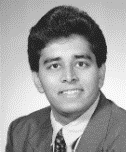
Farhan Gandhi, Ph.D.
Professor of Aerospace Engineering
231C Hammond Building
Penn State University
University Park, PA 16802
Phone: 814-865-1164 / Fax: 814-865-7092
E-mail: fgandhi@psu.edu
Professor Farhan Gandhi has two specific ideas about the role of the university in society, and they influence every facet of his work. First, the university provides a home for the big thinkers, those who are willing to take risks by introducing revolutionary ideas. Second, the university should be training the best and the brightest to serve as problem-solvers for the future.
A member of the Penn State aerospace engineering faculty since October 1995, Gandhi also serves as deputy director of the college’s Vertical Lift Research Center for Excellence. He earned his undergraduate degree in aerospace engineering at the Indian Institute of Technology in his native Mumbai, and his doctorate at the University of Maryland.
Among Gandhi’s current projects is furthering development of the innovation that earned him a Popular Mechanics breakthrough award -- the morphing helicopter rotorblade. When the blade spins fast, centrifugal force causes a finely calibrated spring inside to stretch and lengthen it. When the rotational speed decreases, both spring and blade contract. One day, the design may enable helicopters to fly faster, higher, farther and in tougher environments.
Gandhi is also looking at other means of building rotorcraft components that adapt to conditions, potentially expanding the vehicle’s flight envelope. One possibility is to build components from honeycomb-like materials, properly known as cellular structures. As anyone who has ever crushed corrugated cardboard knows, changing the geometry of the cells changes the behavior of the material. Thus, cellular structures might also be used to construct rotorblades that stretch and contract in different conditions. Likewise, the material could be useful in helicopter skins or in keel beams to enhance crashworthiness.
Both these research interests exemplify Gandhi’s imperative that an academic is supposed to think big. “Often, people don’t do the daring thinking they could be doing,” he said. “A particular design configuration becomes state-of-the-industry, part of institutional history, and people are tied to that. There is a groupthink mindset running along the lines of: ‘What could go wrong in an accident?’ But we in academia have a chance to think instead of the opportunity we have for making something go right.”
For himself, Gandhi also eschews what he calls incremental thinking – the idea of building step-by-step on what has gone before. Periodically, he says, he likes to “clean the floor,” refresh his creativity by starting something entirely new. He knows he’s lucky to have a post that enables him to do this. In fact, he doesn’t even see the job as work.
“My mother looks at me with regret and tells me I work too much,” he said. “But I tell her she doesn’t understand. If your work is what you love, it isn’t work at all.”
Gandhi’s mother and father now live in New York City, having emigrated from India in the early ‘90s. Growing up with his family in Mumbai, Gandhi remembers sitting on the floor and building elaborate houses out of Legos. “I would have been an amazing architect,” he said. “But in the end, the commonality is creating something – whether it’s a helicopter or a house or a piece of music.”
At university and in graduate school, Gandhi in fact did write music. He also sang, and played accordion and guitar, sometimes onstage. Now, with three children under the age of 10 and a job that often keeps him at his laptop till his wife makes him turn out the light, he doesn’t have time.
Besides his own family, Gandhi is close to his academic family, the graduate students he has mentored over the years. “Those who are with you through the Ph.D. become a part of your family – they’re with you forever in a way because you see each other at conferences,” he said. “You know when they are serious about a girlfriend, when they buy a house, when they have a baby. It’s a close-knit family, an extended family.”
While undergraduate classes have as many as 100 students, Gandhi is always on the lookout for the ones who deserve research opportunities and shepherding into graduate programs. He wants to make sure those with aptitude recognize their options so that they make the best use of their skills, talents and brains, not only for themselves but for the good of society’s future.
“I feel like I’ve made a difference in someone’s life when I mentor that person,” he said. “When I look back at my 14 years here, more than the awards and the technical papers, I’m pleased that I’ve affected my students’ lives.”
